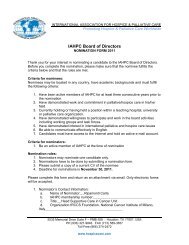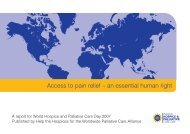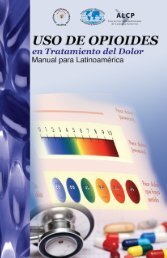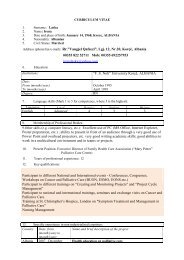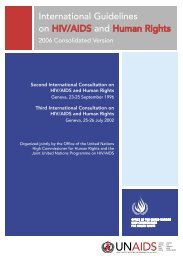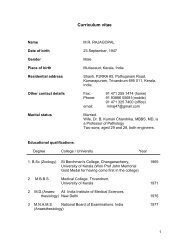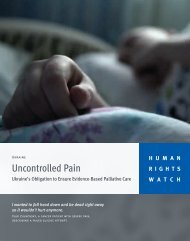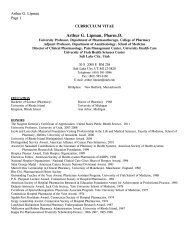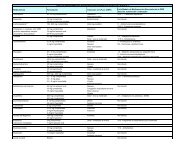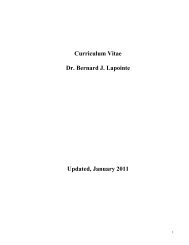INTERIGHTS Bulletin
INTERIGHTS Bulletin
INTERIGHTS Bulletin
Create successful ePaper yourself
Turn your PDF publications into a flip-book with our unique Google optimized e-Paper software.
<strong>INTERIGHTS</strong> <strong>Bulletin</strong><br />
Volume 16 Number 4 2011<br />
179<br />
International<br />
Law Reports<br />
right to special protection as girl-children under Article<br />
VII of the ADRDM; (3) the State violated the right to<br />
judicial protection of JL and her next of kin under Article<br />
XVIII of the ADRDM; (4) there was not sufficient<br />
information to find violations of Articles V and VI of the<br />
ADRDM; (5) the claims under Articles IV and XXIV of<br />
the ADRDM had been addressed under Article XVIII of<br />
the ADRDM.<br />
WOMEN; HEALTH;<br />
EQUALITY, DISCRIMINATION<br />
Violation of Article 12(1) and (2) – access to healthcare<br />
services and Article 2 – establishment of policy<br />
measures to eliminate discrimination – of CEDAW<br />
Alyne da Silva Pimentel Teixera (deceased) v<br />
Brazil<br />
Communication No 17/2008, Decision of the<br />
CmEDAW, 25 July 2011<br />
AT was a Brazilian national of African descent. In her<br />
sixth month of pregnancy, AT went to the health centre<br />
complaining of severe nausea and abdominal pain. She<br />
was given medication and sent home. Two days later she<br />
returned to the health clinic, at which time the doctor<br />
could not detect a foetal heartbeat, which was confirmed<br />
by ultrasound. AT was then given medication to induce<br />
the delivery of the stillborn foetus.<br />
Fourteen hours after delivery, AT underwent surgery to<br />
remove parts of the placenta and afterbirth, but her<br />
condition continued to worsen. The doctors at the health<br />
centre then sought to transfer AT to a hospital. The<br />
municipal hospital had available space but was unwilling<br />
to use its only ambulance to transfer AT. AT waited in<br />
critical condition for eight hours, manifesting clinical<br />
symptoms of coma for the last two hours. On arrival at<br />
the hospital she was in critical condition and needed to<br />
be resuscitated, but the hospital placed her in a<br />
makeshift area in the emergency room hallway. She died<br />
the next day of digestive haemorrhage caused by delivery<br />
of the stillborn foetus.<br />
MT, the mother of AT, submitted a communication with<br />
the CmEDAW claiming that AT was a victim of a<br />
violation by Brazil of her right to life and health under<br />
Articles 2 and 12 of CEDAW. MT argued that Article 2<br />
required immediate action by Brazil to address<br />
discrimination against women when a woman’s right to<br />
life is violated by failure to secure her safety during<br />
pregnancy and childbirth. MT contended that CEDAW<br />
required Brazil to ensure practical implementation to<br />
combat discrimination, not just legal guarantees.<br />
Brazil argued that a number of public policies aimed at<br />
eliminating discrimination against women in the field of<br />
health care are under development and that the failures<br />
in the medical care provided to AT were not because of<br />
discrimination against women but through deficient and<br />
low-quality service to the population, specifically by the<br />
private for-profit hospital. Brazil did not contest that the<br />
services provided to AT were inadequate.<br />
The Committee held that: (1) AT’s death was ‘maternal’<br />
within the meaning of Article 12(2) of CEDAW; (2) AT<br />
was not ensured appropriate services in connection with<br />
her pregnancy; (3) Brazil is directly responsible for the<br />
actions of private medical services outsourced by the<br />
State; (4) the lack of appropriate maternal health services<br />
fails to meet the distinctive health needs and interests of<br />
women, in violation of Article 12(2) of CEDAW,<br />
constitutes discrimination against women under Article<br />
12(1) and Article 2 of CEDAW, and has a differential<br />
impact on the right to life of women; (5) AT was<br />
discriminated against not only on the basis of her sex but<br />
also on the basis of her status as a woman of African<br />
descent and her socio-economic background; (6) it is<br />
recommended that Brazil: provides appropriate<br />
reparation including financial compensation, ensures<br />
womens’ right to safe motherhood and affordable access<br />
to adequate emergency obstetric care, provides adequate<br />
professional training for health workers, especially on<br />
women’s reproductive health rights, including quality<br />
medical treatment during pregnancy and delivery, as well<br />
as timely emergency obstetric care, ensures access to<br />
effective remedies in cases where women’s reproductive<br />
health rights have been violated and provides training for<br />
the judiciary and for law enforcement personnel,<br />
ensures that private healthcare facilities comply with<br />
relevant national and international standards on<br />
reproductive health care; ensures that adequate<br />
sanctions are imposed on health professionals who<br />
violate women’s reproductive health rights, reduces<br />
preventable maternal deaths through the<br />
implementation of the National Pact for the Reduction of<br />
Maternal Mortality at state and municipal levels,<br />
including by establishing maternal mortality committees



